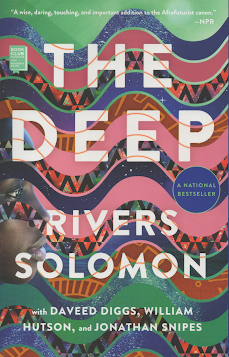First impressions review: The Deep, by Rivers Solomon
I discovered Solomon’s writing through ‘An unkindness of ghosts’; this little novella has many of the same elements I loved – the rich characterization, the evocative language, the explorations of race, gender, sexuality, and trauma - but in a very different context. Here, we enter the world of mermaids who call themselves wajinru (the chorus of the deep) who are the descendants of pregnant African slaves thrown overboard in the middle passage. The first wajinru were nursed by whales and founded their own society in the deeps of the sea. They live lives that are free and unworried – all but one, a historian who carries all the knowledge of their past history and trauma, sharing it with the rest briefly now and again because “forgetting is not the same as healing”. In this generation, that historian is called Yetu.
Yetu is probably autistic, like Aster in ‘Ghosts’, though she manifests it a bit differently. Both are not that great with social interactions, but where Aster is hyper-literal (which I found both relatable and funny), Yetu is extremely sensitive to a wide range of stimuli. This is a problem when it comes to her role as historian, because although she was the best suited to absorb all the memories, they are slowly overwhelming her:
Her body was full of other bodies. Every wajinru who had ever lived possessed her in this moment. They gnashed, they clawed, desperate to speak.
She keeps getting lost in the past and forgetting to eat, and her stress levels are making it even more difficult to deal with the other wajinru who don’t understand. So, during the Remembering ceremony, before she has to take back the memories...she runs.
She ascends so quickly she gets the bends and washes up on shore, where she meets some humans. Yetu forms a bond with a woman named Oori; they seem to understand each other in a way they’ve never been understood before.
“I just mean she’s different, you know?...She’s not so good with…human interaction and any trappings of decorum or rules. I suppose that’s why she prefers animals to people.”… “Perfect, then. I’m not human,” said Yetu… “I am animal.” Suka played with the breath in the back of their throat… “Yes, but only animal-ish?” they said, hedging.
At the same time, Yetu begins to worry about her people – and the humans too. There are storm-clouds building on the horizon, and she knows that wajinru in pain can cause apocalyptic storms. But does that mean she’ll have to sacrifice herself to save everyone she loves1?
1. This doesn’t end like ‘the Little Mermaid’ (either the fairytale or the Disney Movie)… though there is another 1980s mermaid movie one could draw a parallel to!
The memory-carrier aspect reminds me of ‘the Giver’ – which I never liked much as a child. This feels very different, though; the danger here is not so much to the community (either in giving up their humanity or risking their stable dystopia by having those memories) but to the one who must carry the memories the rest of the year. The wajinru are fleeing trauma, not all memories of heightened emotion, which makes Yetu’s dilemma harder and more compelling!
I really like the design of the wajinru. They are much more “fishy” than the traditional mermaid, having gills, webbed hands, bulbous eyes, and sharp teeth. Wajinru include hes, shes, and theys, which I would say is implausible for a species where all individuals having both male and female reproductive function, no one wears any clothes, and there are no distinctions in jobs other than what individual differences in size etc. call for...but they are descended from humans, so it makes sense they might have inherited certain concepts such as multiple genders. Through the memories we also get to see a wide range of wajinru personalities, as well as past conflicts with humans.
That makes me wish this book had been a bit longer; I’d like to know more details about the wajinru-human war, perhaps from the human perspective. We know the conflict was touched off by humans blowing up the wajinru city to try to mine something (maybe oil?) from the seafloor. How devastating were the storms the merfolk unleashed in retaliation? Also, the final resolution of Yetu and Oori’s relationship felt a tad rushed. I liked their dynamic a lot, but this bit could have used more breathing space.
Overall recommendation: This is a beautiful little book. If you are interested a novel take on mermaids (in which they are neither sweet and conventionally attractive nor inherently dangerous monsters), or in a meditation on the role of history and memory in understanding ourselves (particularly when that history is painful), definitely check this out.


